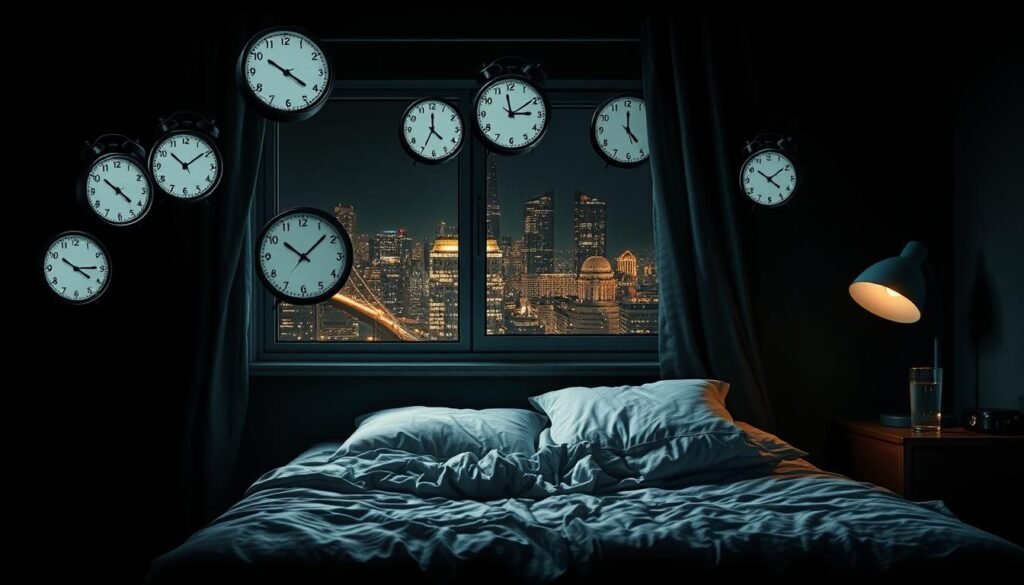About 30% of adults in the United States struggle with chronic insomnia. This sleep disorder can increase the risk of depression and heart disease. It dramatically affects one’s life. Though a single sleepless night might be okay, ongoing difficulties in sleeping well suggest it’s time to see a doctor.
It’s important to know the symptoms and risks of insomnia to better your sleep. Health experts view sleep disorders as a major issue. Getting help early can lead to successful treatment.
There are ways to help yourself sleep better, like sticking to a sleeping schedule and making your room more sleep-friendly. But when these steps don’t work, seeing a sleep specialist is key. They can find and treat the deeper problems causing your sleeplessness.
Key Takeaways
- Chronic insomnia affects around 30% of adults in the U.S., leading to serious health complications.
- Consistently having trouble falling or staying asleep indicates the need for medical intervention.
- Improving sleep quality involves self-help strategies like regular sleep schedules and environmental adjustments.
- Healthcare professionals agree that sleep disorders require timely medical attention.
- Seeking help from a sleep disorder specialist can lead to effective insomnia treatment and better health outcomes.
- Maintaining a good sleep environment is crucial for preventing insomnia.
Understanding Insomnia and Its Impact on Daily Life
Insomnia is more than struggling to fall asleep. It involves different sleep problems that challenge daily routines. Roughly two-thirds of people sometimes face insomnia symptoms. About 10% to 15% deal with chronic insomnia. Chronic insomnia is when sleep issues and daytime symptoms happen for months.
Insomnia really affects your day. People with insomnia may feel more anxious or depressed. Not sleeping well can hurt your mood and make daily chores hard. Some research shows certain conditions can mess up sleep. Being older, a woman, or having health issues like diabetes can increase insomnia risk.
Insomnia can harm personal relationships and limit activities. Sometimes, it might go away on its own. But, for many, it lasts months or years. Better sleep habits can greatly help as a treatment. It can improve sleep and life quality.
Common Insomnia Symptoms to Watch For
It’s essential to know the symptoms of insomnia early. Many report difficulty falling asleep or waking up often at night. These issues can make it hard to fall back to sleep, leading to chronic insomnia.
Insomnia can also show up as:
- Feeling tired during the day, even if you slept all night.
- Inability to focus or being less productive at work or at home.
- Mood changes, like feeling more irritable or anxious.
Adults usually need 7 to 9 hours of sleep nightly. Not getting enough sleep can start a cycle of tiredness and trouble sleeping.
Chronic insomnia lasts over three months and can cause major health issues. Around 10% of people have it. Those with chronic insomnia may face higher risks of diseases like heart problems, diabetes, and depression.
Keeping track of your sleep patterns helps when you talk to doctors. For more insight, check out this resource on insomnia symptoms. It covers many important factors.

When to See a Doctor for Insomnia
Knowing when to seek help for insomnia is vital. It’s about noticing when sleep problems don’t go away. Each year, around 40 million Americans struggle with insomnia. It’s important to catch chronic insomnia early. This means having issues sleeping more than once a week for a few weeks.
Identifying Persistent Sleep Issues
If sleep issues last more than four weeks, it’s time to see a doctor. Long-term sleep problems can make daily life tough. They can cause mood swings, fatigue, and trouble focusing. When feeling too tired affects tasks like driving or focusing in meetings, it’s critical to get help. Also, chronic insomnia can lead to other health issues.
It’s crucial to seek treatment. Learn more about the risks linked with chronic insomnia.
Recognizing Signs of Sleep Disorders
It’s important to notice signs that might point to sleep disorders. Things like loud snoring or stopping breathing while asleep are red flags. They could mean sleep apnea, a serious condition. Feeling very tired during the day or having chronic pain that stops you from sleeping well are signs too. Addressing these early can stop further issues.
| Symptoms | When to Seek Help |
|---|---|
| Difficulty sleeping several times a week | Chronic insomnia suspected |
| Loud snoring or breathing interruptions | Possible sleep apnea diagnosis needed |
| Daytime fatigue affecting activities | Need for medical consultation (e.g., driving, work) |
| Symptoms of depression or irritability | Impact on quality of life |
Being aware of these symptoms and how they affect you is key. Acting on chronic insomnia improves your health and overall life quality.
Causes of Insomnia: Physical and Psychological Factors
Many people struggle with insomnia insomnia causes. It’s important to know why it happens to treat it right. Both body and mind issues are to blame for this tough problem.

Body issues like chronic pain or breathing troubles are big causes. Not moving enough, too much caffeine or alcohol, and drugs make it worse. So does jet lag from lots of travel.
Mind issues play a big part too. Stress, worry, and depression are key factors. How you feel inside can stop you from sleeping well. It shows why dealing with psychological factors matters.
Doctors look at how insomnia affects your life. Some may need to see a sleep disorder specialist. Treatments mix behavior tricks, medicine, and lifestyle changes for better sleep.
| Factor | Description |
|---|---|
| Physical Issues | Chronic pain, uncomfortable sleep environment, jet lag, recreational drug use |
| Psychological Factors | Stress, anxiety, depression |
| Risk Factors | Older age, family history, shift work, frequent sleep interruptions, gender |
| Common Symptoms | Difficulty initiating sleep, waking up too early, poor sleep quality |
Knowing the different causes helps you tackle insomnia. Getting medical advice offers solutions that fit your health.
Check this article for more about insomnia’s effect on health.
Self-Help Techniques Before Seeking Medical Help
Many people with insomnia find relief through self-help methods before going to a doctor. Making simple changes in the environment and daily actions can really improve how well you sleep. It’s crucial to work on sleep hygiene to create a peaceful space and habits for better rest.
Creating a Sleep-Conducive Environment
Making your bedroom a place for sleep is key to better sleep hygiene. Here are some tips:
- Ensure a dark room by using blackout curtains or eye masks.
- Maintain a comfortable temperature, ideally between 60-67°F.
- Minimize noise with earplugs or white noise machines.
- Eliminate electronic devices to reduce blue light exposure before bedtime.
Establishing a Consistent Sleep Routine
Having a regular sleep schedule helps people with insomnia. Follow these suggestions for better sleep hygiene:
- Go to bed and wake up at the same time every day, even on weekends.
- Engage in relaxing activities before sleep, like reading or taking a warm bath.
- Limit naps during the day, especially in the late afternoon.
- Practice relaxation techniques such as deep breathing or meditation to lower sleep anxiety.

Using these self-help steps can really make sleep better. It builds a strong base before looking into medical treatments for insomnia. By making your sleeping area welcoming and following a steady routine, you can see a big improvement in rest quality.
Consulting Your Primary Care Physician for Insomnia
Chronic insomnia affects health and daily life deeply. If you’re facing ongoing sleep issues, seeing a primary care physician is key. They can check your symptoms, rule out health problems, and suggest treatments that fit you.
They may talk about your lifestyle and offer advice on better sleep habits. If sleep issues continue, a referral to a sleep clinic could follow. These clinics provide detailed assessments and might do sleep studies. These studies watch your breathing and brain during sleep.
It’s not widely known, but many professionals can help with insomnia. Psychiatrists can give medicine, and psychologists focus on therapy. For kids with sleep problems, pediatricians are crucial. They offer special care for young ones.
If your insomnia lasts over four weeks, get medical support soon. Getting help early helps improve sleep and well-being. A strong bond with your doctor can lead to better sleep and brighter days.
Before visiting the doctor, it’s good to know how to talk about your symptoms. For tips on this, check out this helpful guide.
What to Expect During Your Doctor’s Visit
Going to see a doctor about insomnia can make you feel nervous. Being ready helps make this important doctor’s visit work better. Knowing what to talk about beforehand lets you explain your sleep problems well. Keeping track of when you sleep gives the doctor useful information for the insomnia diagnosis.
Tracking Your Sleep Patterns
Writing down your sleep habits for a few weeks is a good idea. You can note:
- Time taken to fall asleep
- Number of awakenings during the night
- Total hours of sleep
- Daytime naps
- Activities and food consumed before bed
There are apps that make this easy and organize your sleep data. This helps your doctor understand your sleep issues better. Detailed notes make it easier to figure out the problem and find the right treatment.
Preparing Questions to Ask
Thinking of questions to ask before your visit can make the conversation more useful. Here are some topics to think about:
- What are the potential causes of my insomnia?
- Could my medication be affecting my sleep?
- What treatment options are best suited for my situation?
- Are there lifestyle changes I can adopt to improve my sleep?
- What are the possible side effects of prescribed medications?
Asking these questions can make your doctor’s visit more helpful. Looking into different ways to manage insomnia, like therapy or home remedies, helps find the best solution. For more on treatment options, check out this resource.
Insomnia Diagnosis: Understanding the Process
Insomnia affects many adults, with 10% to 30% of people affected. Getting the right insomnia diagnosis starts with a full medical evaluation. Doctors ask about your sleep and daily life. This first step helps tell chronic insomnia from the short-term kind.
For a correct diagnosis, it’s key to share your sleep details. Chronic insomnia means trouble sleeping at least three times per week for over three months. It hits about 10% of adults. On the other hand, short-term insomnia affects 15% to 20% of people and lasts less than three months.
In the medical evaluation, doctors might suggest actigraphy. This test uses a sensor to track sleeping and waking times. It spots sleep problems. Plus, blood tests could check for things like thyroid issues that add to insomnia.
To fully understand insomnia diagnosis, detailed checks are vital. Tests like polysomnograms, which look at sleep quality, are important. Combined with what patients share, these tests help doctors understand sleep troubles fully.
If you have insomnia, being active in the diagnosis process is crucial. A detailed check-up leads to personalized treatments. These plans help overcome the unique issues insomnia brings.
Available Insomnia Treatments and Therapies
Many people struggle to find the right treatment for insomnia. There are various options like therapy, lifestyle changes, and medicine. Finding what works best for each person is key to getting better sleep.
Behavioral Therapy and Self-Help Strategies
Cognitive Behavioral Therapy for Insomnia (CBT-I) is a top choice. It’s effective and has few side effects. This behavioral therapy helps change bad thoughts about sleep into positive habits.
Simple practices can also improve your sleep, like meditation, yoga, and regular exercise. Setting a sleep schedule, making your bedroom soothing, and less screen time at night help too.
Medications for Insomnia: What You Should Know
If therapy and lifestyle tweaks don’t work, medications for insomnia might be the next step. Drugs like triazolam (Halcion) and temazepam (Restoril) help you sleep but could be addictive. Alternatives like zolpidem (Ambien) are also common but might make you groggy in the morning. Ramelteon (Rozerem) is a safer option with less risk of dependency or grogginess.
Discussing these choices and possible side effects with a doctor is vital. Over-the-counter sleep aids are an option, too, but they can make you drowsy during the day. For more details on treating insomnia, checking out various treatment options can help.
| Medication Type | Examples | Key Considerations |
|---|---|---|
| Benzodiazepines | Triazolam (Halcion), Temazepam (Restoril) | Can induce sleep but may lead to addiction |
| Non-Benzodiazepines | Zolpidem (Ambien) | Effective but may cause morning sleepiness |
| Melatonin Agonists | Ramelteon (Rozerem) | Less likely to cause morning sleepiness or addiction |
| Over-the-Counter | Various antihistamine-based drugs | Can cause daytime sleepiness and dry mouth |
Conclusion
Insomnia is a big problem that can really hurt how well someone lives. About 30% of adults say they have trouble sleeping. It’s important for these people to look for medical help.
Getting help is key when sleep issues start making daily life hard. It can lead to feeling very sleepy in the daytime and can cause anxiety and depression. Counseling, changing some habits, and sometimes medicine can help manage insomnia. This means better sleep at night.
Cognitive-behavioral therapy (CBT) is especially good for long-term sleep problems caused by anxiety. It’s a way to improve sleep without using drugs.
Dealing with insomnia is vital for staying healthy over time, especially for older people and those who work at night. By using the right help and following expert advice, you can get better sleep. Remember, good sleep means good health.